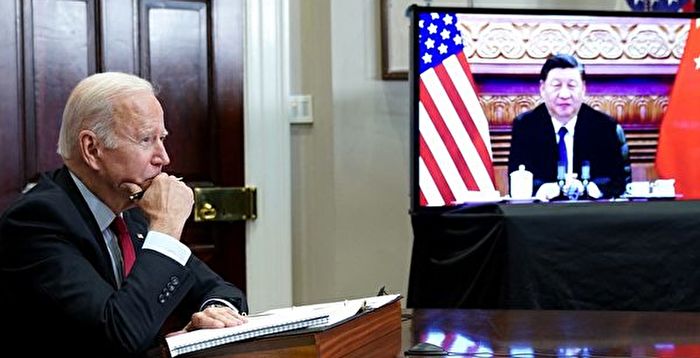[Epoch Times, December 22, 2021]After the U.S. continuously imposed sanctions on the CCP, the CCP was forced to turn to a low profile. However, the U.S. sanctions the CCP officials in Hong Kong again. Seeing that they can no longer conceal it, the CCP had to declare against the U.S. Peer-to-peer countermeasures”; although more symbolic, they have plunged China and the United States into a new low.
On November 15, after a video meeting between Biden and Xi Jinping, the CCP tried to promote diplomatic victory and fabricated the illusion of the relaxation of Sino-US relations. Unexpectedly, the United States kept making moves and the CCP tried to parry, but there was no real card to play. The CCP’s Taiwan card has long been played too far, leading the United States to respond strongly and constantly hitting the “red line” drawn by the CCP. The Taiwan issue has become the focus of the world, and the CCP has to try to cool it down.
On November 17, Kissinger, an “old friend” of the Chinese Communist Party, participated in the Bloomberg New Economic Forum online, stating that Sino-US relations have gone from the “foot of the new Cold War” two years ago to the “mountain road” of the confrontation a year ago. , Climb the cliff”.
Kissinger has long seen the essence of Sino-US relations, and has constantly tried to persuade the CCP not to provocate and escalate confrontation. However, the CCP always feels that the Biden administration is weak and has been reluctant to keep a low profile. The CCP has no more cards to play, but it is reluctant to subdue it. The White House can only continue to “compete fiercely.”
The U.S. government took the lead in a diplomatic boycott of the Beijing Winter Olympics. The CCP had no choice but to lie that it did not invite U.S. officials. After various countries followed suit to varying degrees, the CCP was extremely embarrassed, but could not help it.
While the United States continued to consolidate the anti-communist alliance in the West, it also hosted the Democracy Summit on December 8, which made the CCP feel further isolated and had to stop the Sino-U.S. tone of “cooperation and win-win”, which once again set off a climax of anti-American propaganda. . Sino-US relations have entered a new downward spiral.
On December 10, the United States announced the expansion of sanctions involving Chinese officials who violated human rights in Xinjiang.
On December 14, the U.S. House of Representatives unanimously passed the “Prevention of Forced Uyghur Labor Law.”
On December 14, U.S. Secretary of State Antony Blinken visited Southeast Asia and delivered a speech in Indonesia, claiming that the CCP’s “aggression” in the South China Sea would “take the high seas as its own” and create tension in the Taiwan Strait; Lincoln clearly stated that “all our national power, including diplomacy, military, intelligence, etc., should be more closely integrated with the power of our allies and partners”, just like the “quartet mechanism.”
On December 16, the U.S. Department of Commerce included 34 Chinese companies on the “Entity List”; the U.S. Department of Treasury included 8 Chinese companies on the blacklist of the “Chinese Military Industry Integrated Enterprises”.
It was only a day later that the CCP responded in a low-key manner in the name of the Ministry of Commerce. Seeing that the United States is really moving, apart from continuing to deny the facts of human rights persecution, the CCP did not dare to continue to speak harshly, and instead began to complain. On December 18, Xinhua News Agency also quoted the Chinese Communist Party’s ambassador to the United States, Qin Gang, once again shouting “cooperation and win-win” to the United States.
On December 20, in response to the Hong Kong election farce manipulated by the CCP, the US State Department and the Treasury Department announced sanctions on five deputy directors of the Hong Kong Central Liaison Office. The Five Eyes Alliance’s joint statement criticized the CCP for sabotaging Hong Kong’s democratic elections. On the same day, the U.S. Secretary of State Blincol appointed Uzra Zeya as the Special Coordinator for Tibet.
The U.S. hit continuously, and the CCP finally couldn’t sit still. On December 21st, in order to show that it did not suffer from “striated rickets” against the United States, the CCP declared that it “reversed” the United States and imposed retaliatory sanctions against four people including the chairman of the US International Committee on Religious Freedom. The CCP’s retaliation is neither “equal” nor of much practical significance. The CCP’s statement only dared to mention the “Human Rights in Xinjiang” issue and avoided a series of sanctions imposed by the United States. It was mainly used for domestic perfunctory and propaganda, but it undoubtedly declared that Sino-U.S. relations have entered a trough again.
On December 16, the U.S. Senate confirmed the nomination of Nicholas Burns as ambassador to China. In the past year, Sino-U.S. relations have deteriorated and the U.S. ambassador to China has been vacant. Burns stated at the hearing that the CCP has always been an aggressor in its relations with Taiwan, Vietnam, Japan, and the Philippines; the CCP has violated its commitment to Hong Kong. He may go to Beijing to take office in 2022, but the relationship between the United States and China is difficult to turn around.
2021 is coming to an end. I am afraid that many people have not expected that Sino-US relations will take a sharp turn. Although the CCP’s retaliatory sanctions are mainly internal propaganda, they will also make the US government more sober. The confrontation over the past month or so should also enable the White House to realize what kind of “fierce competition” can have a real restraining effect on the CCP and build a real “guardrail.”
The Epoch Times
Editor in charge: Gao Yi#
.
